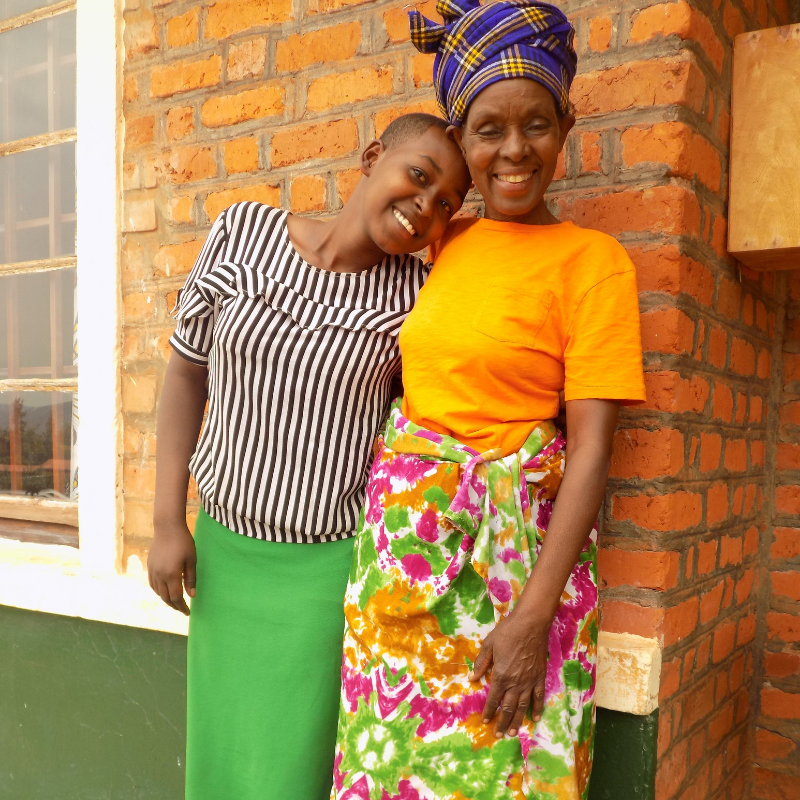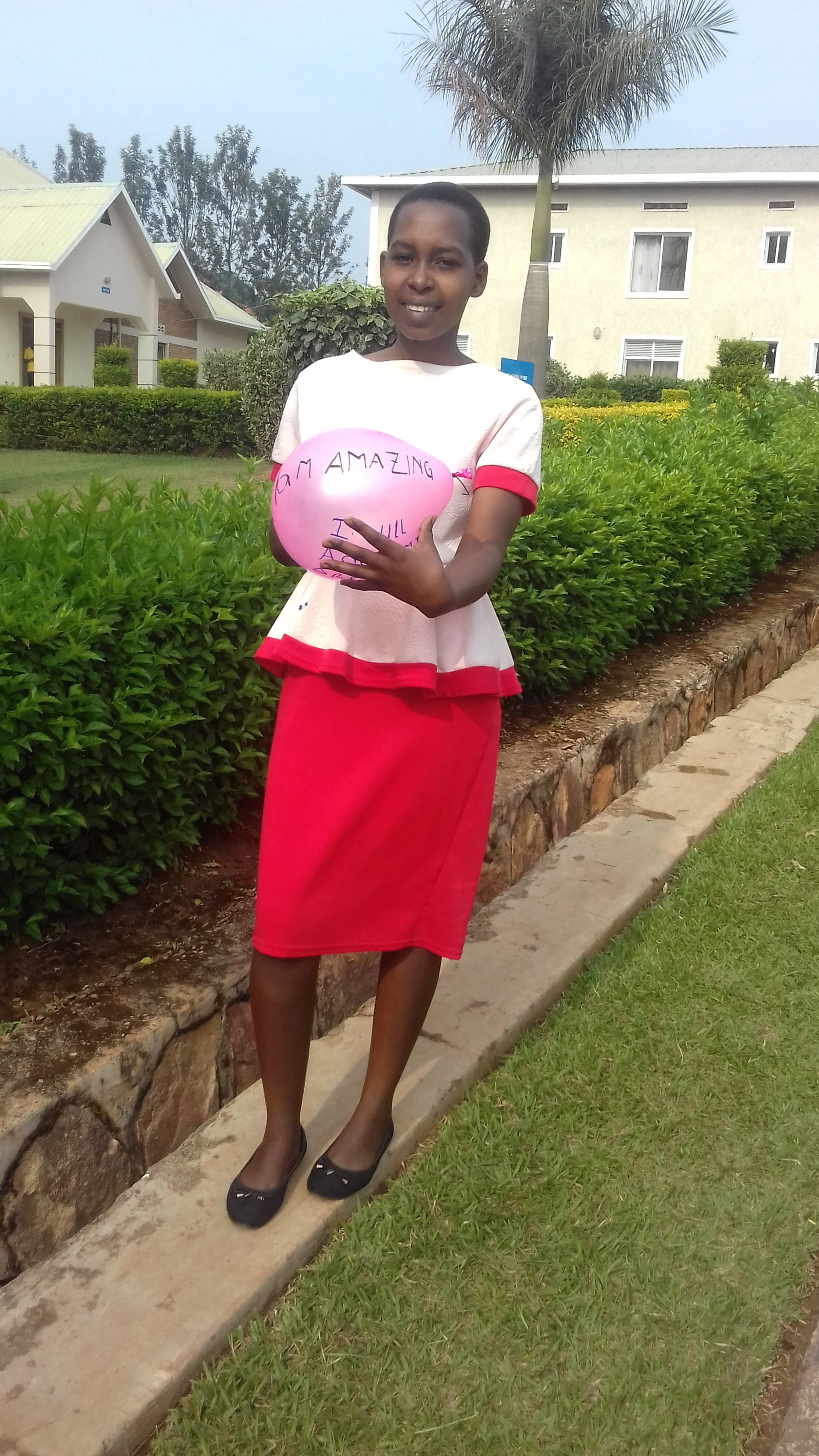Meet Scovia, A Komera Post-Secondary Student!
Scovia is currently in our PSTP, but before that, she was a secondary scholar! Our Development and Comms Manager, Jacquelyn, sat down with her to learn more about what it was like transitioning from a day school to boarding school at FAWE, what she has been up to since graduating from secondary school, and what her plans are for the future!
Q. How old are you, when did you join Komera, and what did you study in secondary school?
Hi! My name is Scovia, I’m 20 years old and I joined Komera in 2018. I studied Mathematics, Biology, and Chemistry at FAWE Girls School
Q. How did you first hear about Komera?
The way I heard about Komera, I was studying near the Komera office. It was a day school called GS Rwinkwav. So, there was a day when Komera Scholars came to school to advise more about girls about our Health. They also wanted to tell us more about Komera. They told us how it works, how it helped girls and the category of girls they help. So, they told us that they help girls from poor families to achieve their goals. So that's how I learned about Komera.
Q. What was that transition like for you, to go from a day school where you go home to your family at the end of the day, to a boarding school where you don’t see your family every day and you’re living with different people?
When I went to boarding school, I was coming from a day school. Then Komera helped me join the boarding school, which is far away. When I reached there, I was very happy because I saw new changes in my life, because it was my first time attending the boarding school [FAWE Girls School Gahini]. And then when I reached there, I learnt new skills. I learned how to live with other people and we learned how to take of ourselves. They [FAWE] taught us confidence. I learned a lot from boarding school and which I couldn't get when I moved in a day school.
Q. Were there any hard parts about that transition? Were there any areas that made it difficult going from the day school to the boarding school?
First of all, I didn’t know how to take care of myself without asking, maybe help from my parents. I also didn't know how to communicate with others, or how to live with the other girls of the same age without living with the older people. I also faced the challenge of English speaking, because in the way I had been studying [at day school], our English was very low. So, I had that challenge. But through by through, I learned English, and now I am able to at least speak something.
---- Scovia was being very modest, her English was great throughout our whole conversation! ----
Q. What do you think was the biggest things that helped you the most in succeeding at FAWE?
Yeah. Okay. The things that were very helpful to me, which I got from Komera, they are many. First of all, they cared about me, whether in school, even in terms of hygiene, even the transport cost, school fees, even some of the materials, like the central parts, they were the ones who provided dozen materials to me.
Even the books, bags, all of those were from Komera. And I couldn't use my ability, I had no ability to buy those materials. It's all from Komera. Another thing is that Komera used their mentors to support us in terms of mentorship, that we at least feel that we are able and we can make something of our future. Even when we left [FAWE], they continued to mentor us. They trust that you are able, self- confident. The advice from our mentors made me to feel powerful and I feel that I will manage the course that I had joined.
Again, Komera helped me in providing me with the transport cost because from moving from my home to going to boarding school, it is far. So, they provided me with transport fees so that I could go to school. Even sometimes when I felt that I'm not okay, I could approach our mentor and then they advised me.
Q. So, I know you said you studied mathematics, chemistry, and biology, and now you're doing the post-secondary transition program with Olivia. What are your plans for after you're done with the PSTP? Are you wanting to go to university or start a business?
Okay, as you have said, I'm in a transition program which is post-secondary with my sister Olivia. So, in that post-secondary, we learn a lot. We learn the computer, we also learn business management, we learn career guidance, we learn even English, whether speaking it fluently or speaking it in the public. So, I'm getting those skills.
So, after getting those skills, I will be able to join university when I'm strong, when I know that my course that I'm going to take is not hard. It's easy for me to achieve. So those skills that I'm getting now are going to help me to join university strong, without fear, without worrying that maybe I don't manage. I'll be able to do university and I’ll continue my studies of Nursing. It's what I want to take in university.
Q. Nursing? That's fantastic. Have you been connecting with Josie (Komera’s Teen Mother Program Coordinator and Nurse) a lot then?
Yeah, she normally advises us and she tells us to all the ways she takes care of parents at Komera. I also feel that I can also be able to do nursing. She tells us that nothing is hard, all things are possible. Once you focus on it, and you feel that you need that thing, nothing will be hard for you. I also get some skills from her because she's here advising us and tells us more about her career.
Q. Ok last question, if you had to tell someone about Komera and, who or what Komera is to you, what would you say?
Okay, if I want to tell someone about Komera, I can tell her that it's a nongovernmental organization that supports girls from poor families to achieve their goals. I can also tell her that it is an organization which does not accept corruptions. It's just helping those poor families where those girls come from and then support the girls to go to school.
I can also tell him or her that Komera is a home for all. Because if you don't have ability to join school, they are the ones to help you and join that you achieve your goals. I can also tell her that Komera is like a parent because they take care of girls and help them where they need and improve their ability, whether mentally or physically.
I can also tell him that Komera also is an organization that help parents of those girls from poor families to form cooperatives. And they also work together to transform their homes even in the community they live.
It’s always a fun experience getting to sit down with our scholars (virtually) and learn more about their experience with Komera, and to hear what their future plans are! Currently, Scovia is waiting to hear from the university she applied to about being accepted into the nursing program. If she gets in (we know she will!), she’ll start a three-year nursing program! Stay tuned for updates next month!



